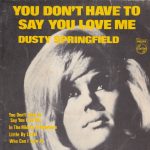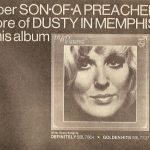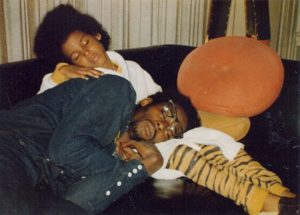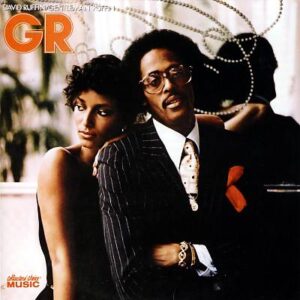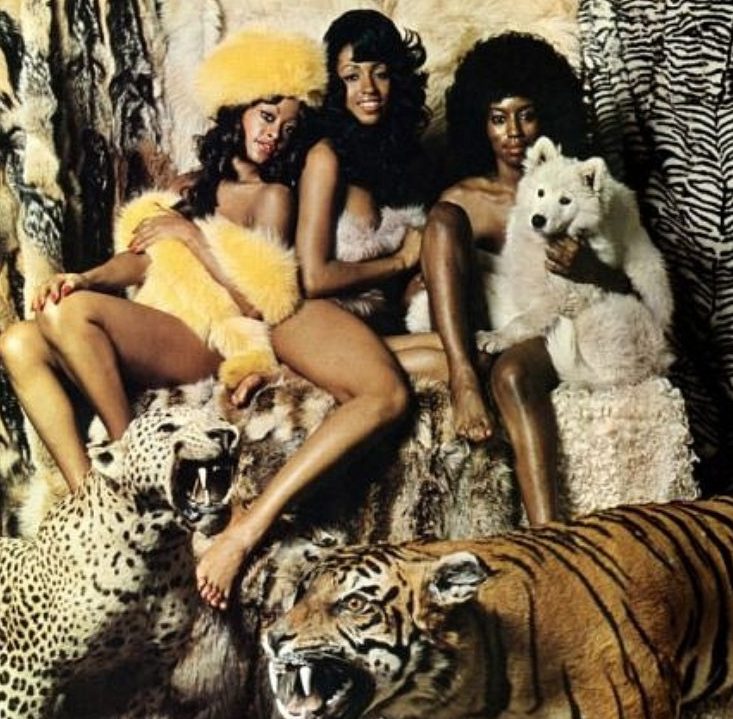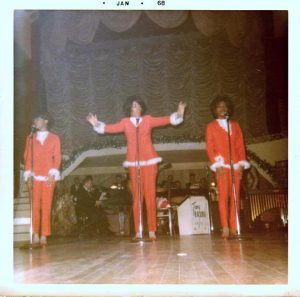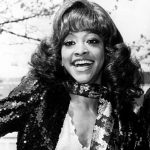
Dusty in Memphis
Dusty Springfields finest recording
Dusty Springfield was one of the first British female superstars the prototype of every future singer who would emerge from Britain. Of course she is well known for her Super hit “You don`t have to say you love me” among other greats from that period. During her prime she had many memorably moments.
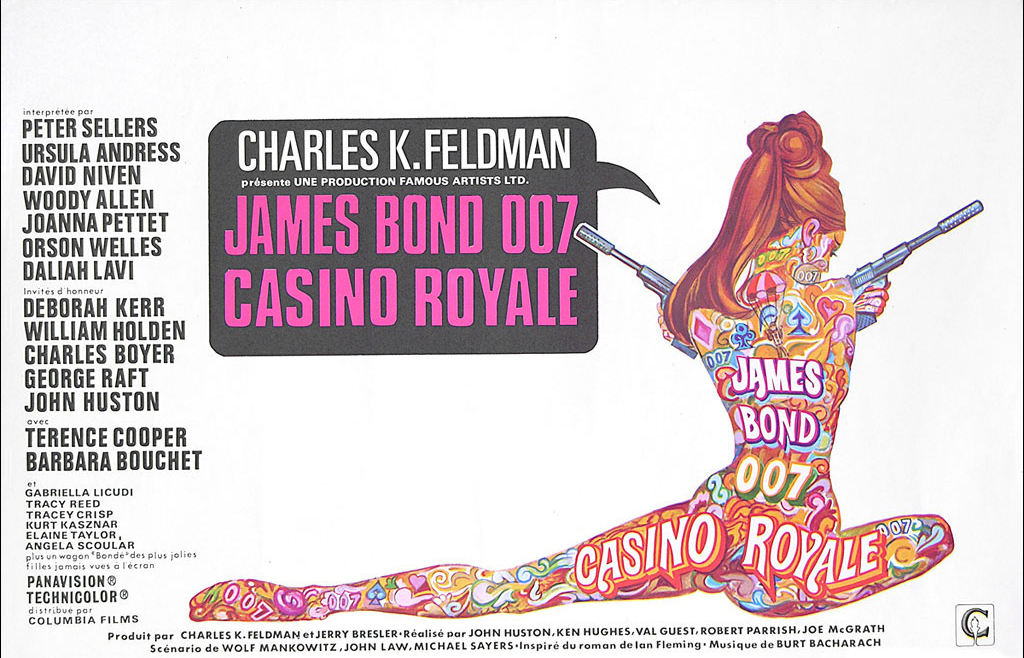
The look of Love title song from the Bond Parody Casino Royal (1967)
And yet another highlight from many highlights is
By 1968 Dusty released 4 full length albums in 4 years between Pop, Soul and Ballads. Her Song Spooky which was recorded on January 24th in 1968 and released on September the 4th in 1970 was her first step towards Dusty in Memphis.
In 1968, Dusty entered into a contract with Atlantic Records for the United States, which meant that she had a different record label for each side of the Atlantic (previously she had been signed to Philips both in the UK and the USA). Dusty’s new contract allowed Philips in the UK to release American recordings and Atlantic in the USA to release British recordings.
Jerry Wexlers (producer) describes how Dusty in Memphis came to life

It was arranged for Dusty to come to New York to begin preparing for the session. I began an intense hunt for songs that I could believe in and that prayed would please her. With the help of my assistants, Jerry Greenberg and Mark Myerson, we spent several months amassing a cornucopia of lead sheets, lyrics sheets, and acetate demos. In my zeal to provide her with the widest possible choice of material, we wound up with seventy or eighty songs.
I thought it would be comfortable for her to come out to Great Neck, where we could work without the distractions of a frantic record office. Dusty showed up at my door, and we went into my living room. We soon found ourselves ass-deep in acetates on tables, chairs, shelves, the floor. As I played her song after song, I was hoping for a response-would she like this one? If not, how about the next one?
Most of the day, and well into the night, I became first fatigued, and then spastic, as I moved from floor to player, then back to the shelves, the chair, and the tables, in what turned eventually into a ballet of dispair.
After going through my entire inventory, the box score was Wexler 80, Springfield 0. Out of my meticulously assembled treasure trove, the fair lady liked none.****
Dusty recalls this slightly different. In the early days of choosing material, she was sent a tape by Jerry Greenberg containing about 20 songs and from that tape she picked “Son of a Preacher Man” and “Just a little lovin'”
When doing research for the article I talked to Jerry Greenberg. He,stated clear that the song selection and presentation to Dusty was Jerry Wexler`s Job.
The Studio
The Muscle Shoals Studio Session which was booked needed to be cancelt due to the delay of selection for the songs. Therefore Chips Moman’s American Sound Studio was booked. Her follow up band should be the Memphis Boys aka the Memphis Cats.Gene Chrisman (drums), Tommy Cogbill and Mike Leech (bass), Reggie Young (guitars), and keyboardists Bobby Emmons and Bobby Wood. The Sweet Inspirations the group on Dusty in Memphis were booked by Jerry Wexler himself.
Dusty in New York?
While Jerry Wexler often states that Dusty did not sing in Memphis, this is also confirmed in the Paul Sexton BBC Radio 2 documentary about the album:
We would have arranger make the charts on all the songs, but they were simple, almost simplistic. Because instead of regulation chord symbols they went by numbers, 1 to 7. My practice was to start the session at 1 o’clock in the afternoon and the musicians were ready with all of the songs on their music stands with the very simple chord sequences. That`s all there were; there were not arrangements, there were just chord sequences. This was the Southern way of recording that I had learned in Memphis and Muscle Shoals: to build the song organically what you did, you had the musicians start to play these chords, and just playing the cords, and just playing the chords the guitarist or keyboard man would come up with a lick or an idea, and after a while – it never took to long- a rhythm pattern would be established that would really be the basis of the song. And when the rhythm track was almost finished, in the penultimate moment, that`s where I would have the singer come n and start to sing so that he or she could modify what they were doing to particularly suit and accommodate the singers`s phrasing. Only one problem: Dusty wouldn`t sing. So we had to image it.
As Producer Arif Mardin recalls and as also the musicians confirm, Dusty did in fact sing in Memphis, but only enough to give the instrumentals an idea of what she might do, so that they could then “imagine it” and build their parts accordingly.
Also, as the musicians remember Dusty did in fact sing in Memphis:
Cover Art:
The Cover (US – Version) was done by Haig Adishian one of Nesuhi Ertegun`s ( was a Turkish-American record producer and executive of Atlantic Records and WEA International)stable of graphic Artists.
https://www.discogs.com/artist/1717324-Haig-Adishian
Dusty about her different style of singing on the record in 1977:
“..that was never my real voice. It was a strain for that effect, all the
time a strain. I shouted and screamed because I believed with all my
naivete that that was the way to sing with soul.”
“And then, one day, I realised that I was crazy, putting myself and the
audience through this madness and risking my voice, so I took it down a key and I guess that the Memphis album showed me that there was no need to sing in a style other than my natural one.”
Just a Little Lovin’
From the Songs Dusty did chose were Son of a preacher man and Just a little lovin a while and mann song.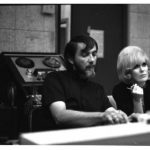
Just a little lovin’
Early in the mornin’
Beats a cup of coffee
For starting off the day
Was this one wasted as a B-Side? Dusty obviously liked this one as this the next to “Son of the Preacher Man” the most performed song from the Dusty in Memphis Album.
In my opinion this one is a perfect fit to be on a B-Side as Son of a Preacher Man which was initially rejected by Aretha Franklin.
From todays point of view I can`t say if this song as an a side might have been a hit. We’ll never know.
Barry Mann said about Dusty’s version of the song: “To me Dusty Springfield is one of the great female singers of all time. She has a voice like silk that can make your heart melt. Her interpretation of my song ‘Just a little Lovin’ is as good as it can get (and maybe even more).”*
- “Just a Little Lovin'”, a 1968 song by Dusty Springfield from Dusty in Memphis, covered by several performers
- Just a Little Lovin’, an 1970 album by Carmen McRae
List of released Version from this Song
https://secondhandsongs.com/work/22722/all
List of Dusty`s live performances:
Decidedly Dusty [show 2] BBC1 (edited from the show when aired)
The Andy Williams Show (NBC) 7 February 1970
The Dick Cavett Show (ABC) February 1970
The Dave Cash Show (BBC Radio 1) 4 October 1970
Live at the Roxal Albert Hall (not televised) recorded 3 December 1979
Released:
First US Release: Atlantic single #2580 (b-side of “Son of a preacher Man”)
US Release Date: 9 November 1968 as Single and 18 Januar 1969 on (album)
UK Release Date: 29 November 1968 (single) 18 April 1969 (Album)
